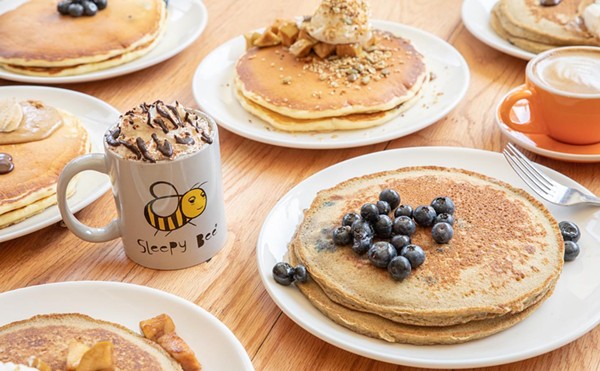One of the best episodes of Portlandia has to be the one where Fred Armisen and Carrie Brownstein’s characters take a satirical stab at farm-to-table food fanatics who order chicken in a restaurant. It’s not enough for these two to know that their meal will consist of a local, free-range, organic bird that’s been fed a diet of sheep’s milk, soy and hazelnuts; the conscientious consumers also view a photo of their chicken, named Colin, in a dossier presented by their waitress and insist on visiting the nearby farm to make sure Colin lived a happy life.
While the story of Colin might be the extreme, plenty of people care deeply about where their food comes from and how it is produced. Urban veggie gardens have become the norm in Greater Cincinnati, and for those who want to expand their mini-farms and diets with livestock, you may want to consider adding chickens and bees.
Megan Park and Joe Belluso have a house on one-eighth of an acre in Pleasant Ridge. The small lot is home to a vegetable garden, an herb garden filled with medicinal plants, nine chickens and a hive full of bees. This season, Belluso will also be adding a cold frame so that the family can enjoy greens throughout the winter.
Park and Belluso keep their bees, which they use to pollinate the garden, in a top-bar style hive. This hive simulates a hollow log, as opposed to the more familiar box-style hive known as a Langstroth. “My daughter is the only person who has been stung,” Park says, “and that’s because she messes with them. She tries to hold them and pet them.”
Liz Tilton, a honeybee expert from local full-service bee company TwoHoneys Bee Co., says that beekeeping is an excellent family activity and a great way to teach children responsibility. “Through beekeeping, children learn to pay attention,” she says. “They learn to discern. They learn to look closely. They learn to watch bee behavior and to perceive temperament. They learn how the plants and the weather in their local world effect what’s going on in the hive.”
Park had to be convinced to keep chickens — they were entirely her daughter Tessa’s idea, and Tessa is responsible for all chicken care — but the taste and quality of the eggs has completely won her over. “The eggs are just so amazing,” Park says. “It’s so funny to make an egg for someone who has only eaten store-bought eggs.... The color of the yolk and the thickness of the white; it’s like a totally different product.”
When asked if the family plans to eat the birds as well as their eggs, Park replies: “We just got these chickens last May, so they’re not even a year old yet. I guess chickens lay for about three years, and then we’ll have to decide what to do with them. My daughter is horrified at the idea of eating them, but I say it’s the whole food cycle and you have to know where your food comes from, and understanding that we eat chicken and a chicken has died for that.”
Before you go all Old McDonald in Hamilton County, check out the complete list of zoning regulations at building.hamiltoncountyohio.gov and remember that individual neighborhood rules can overshadow Hamilton County regulations, so before you plan anything, check with your own community. Here are some other things to keep in mind:
• You may have up to 10 chickens, but they must all be hens; roosters are not permitted. Nobody actually wants to hear “cock-a-doodle-do” at the crack of dawn.
• If your property is less than 1 acre, you may have up to two colonies of bees.
• Both chickens and bees need to be kept in your backyard.
• Whatever you produce is for private consumption only; you can’t sell anything.
• Your chickens need a safe, well-built enclosure. It doesn’t need to be fancy, but it does need to keep them from becoming a neighborhood nuisance as well as a tasty treat to all manner of prey.
• You don’t need to live in a house with a yard to have bees. Bees can fly and will forage up to 5 miles for pollen and nectar. Tilton has friends who keep hives on fire escapes overlooking Washington Park or on tiny decks in OTR. Other friends keep vibrant hives in small yards and on rooftops downtown. You will, however, need to provide your bees with clean drinking water.
For more information on urban beekeeping, visit TWOHONEYS BEE CO. at cincinnatibees.com.






